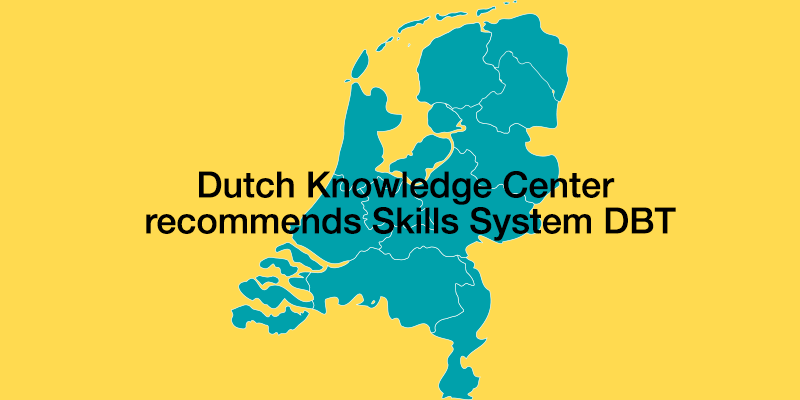Emotion regulation skills training DBT for persons with mild intellectual disabilities
The main objective of the intervention is to reduce self-harmful, suicidal and aggressive behaviors.
Purpose
The goal of the SS DBT is to reduce or stop self-harming, suicidal and/or aggressive behavior by increasing adaptive emotion regulation skills and reducing maladaptive emotion regulation skills. To increase emotion regulation skills, work is being done on distinguishing between emotional experiences and increasing skills to deal with rising emotions.
Target population
The Emotion Regulation Skills System Training DBT (SS DBT) is intended for people aged 16 and over with a mild intellectual disability (MID) who exhibit self-harming, suicidal and/or aggressive behavior. An important factor in the development of self-harming, suicidal and/or aggressive behavior is emotional dysregulation. Contraindications for SS DBT are psychotic dysregulation and acute substance use.
Approach
A person is registered, after which an intake takes place, when indication follows entry into the SS DBT (2 x 12 meetings). During the skills training, there are 2 network meetings where someone from the participant’s social network is present. In addition, there is weekly consultation for the trainers in the consultation team with the aim of supervision.
Material
There is a handbook for trainers in which the purpose, proof, and working method of the SS DBT are explained. The handbook contains the workbook for participants with learning guides and home worksheets. These can also be accessed via a link on the website of publisher Pearson. A leaflet is available for those who are interested.
Substantiation
The SS DBT focuses on increasing adaptive emotion regulation skills and reducing maladaptive emotion regulation skills. In this way, it is expected that there will be a reduction in self-harming, suicidal, and/or aggressive behavior. The SS DBT is based on the biosocial theory and the skill deficit model by Linehan (2002). The theory assumes that emotion dysregulation arises from mutual influence, with a biological vulnerability on the one hand and a disabling environment on the other.
The effect is that the person ends up in a vicious cycle characterized by skill deficits, self-invalidation and negative outcomes. The SS DBT has been specifically developed for people with MID, and is based on cognitive load theory. Behavioral theory, instructional theory, commitment, dialectics, and group therapy are the presumed active factors in achieving change in the participant.
Research
A process evaluation was carried out with the aim of investigating participation and failure rate, mapping the experiences about the implementation and user-friendliness, and gaining insight into the potential effectiveness. Findings show that of the 20 participants who start the intervention, 15 succeed in completing a training series. SS DBT is rated by participants as user-friendly, the trainers rate the SS DBT as easy to implement. The SS DBT was performed as described and several positive changes are observed in participants.
Contact Details
Developer/licensee of the intervention
Organisation name: PlurynE-mail: [email protected]
Phone: 0613174553
Downloads
worksheet Intervention Emotion Regulation Skills Training DBT
About this intervention
ACCEPTED
Recognition is possible at the following levels:
• Well-founded/grounded
• Effective according to initial indications
• Effective according to good indications
• Effective according to strong indications
This intervention has been assessed by the accreditation committee as:
Well-founded
DATE OF RECOGNITION
13-09-2023
RECOGNIZED BY
Accreditation Committee for Long-Term Care – Subcommittee on Disability Care
COMMISSION’S EXPLANATORY STATEMENT
The intervention Emotion Regulation Skills Training DBT helps people with a mild intellectual disability to better regulate their emotions. The committee is excited about the appropriate translation of the intervention developers: from regular to a DBT for this target group. The intervention contains elaborate materials. The main goal is clear and the clearly described studies provide a good foundation.
POSTED ON
27-02-2024
The accreditation committee
The accreditation committee consists of two subcommittees: the subcommittee on care for the disabled and the subcommittee on care for the elderly. The committee is independent and consists of professors and experienced practitioners. They determine, on the basis of clear criteria, whether an intervention is included in the database of recognized interventions.
Vilans supervises the recognition process and facilitates the committee, but is not part of it.
Chairman of subcommittees
Prof. dr. Henk (H.F.L.) Garretsen, Tilburg University
Secretary of the subcommittee on disability care
Dr. Tamara Bouwman (Vilans)
Members of the subcommittee on disability care
Prof. dr. Petri Embregts (Tilburg University)
Dr. Sabina Kef (University of Amsterdam)
Dr. Sandra Mergler (Erasmus MC)
Prof. Robert Didden (Radboud University; Trajectum)

